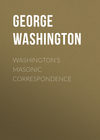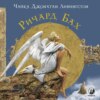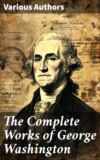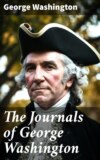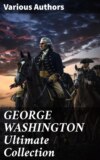Читать книгу: «Washington's Masonic Correspondence», страница 6
XV
Correspondence with G. W. Snyder, 1798
AS to the correspondence with one G. W. Snyder (Schneider), who represented himself as a preacher of the Reformed Church of Fredericktown, Maryland, our late Brother James M. Lamberton, in his address before the Right Worshipful Grand Lodge of Pennsylvania, at the celebration of the "Sesqui-centennial Aniversary of the initiation of Brother George Washington into the Fraternity of Freemasons," held in the Masonic Temple, in the City of Philadelphia on Wednesday, November the fifth, A. D. 1902, states:64
"It is well known that during the French Revolution religion was dethroned, and reason installed in the place of Deity. The spreading of such doctrines was by many ascribed to the 'Illuminati,' who were supposed to be Masons. During this period clubs like the Jacobin Clubs in France were formed in this country, and the spread of these doctrines was greatly feared, especially by the clergy, and in 1798 one of them, one G. W. Snyder, of Fredericktown, Maryland, wrote to Washington sending at the same time a book entitled 'Proofs of a Conspiracy,' etc., by John Robison,65 the conspiracy being 'to overturn all government and all religion'."66
This letter, sent to Washington at Mount Vernon covered no less than six pages; following is a verbatim copy of the original now in the Library of Congress.
"To His Excellency George Washington.
"Sir,—You will, I hope, not think it a Pre | sumption in a Stranger, whose Name, | perhaps never reached your Ears, to ad | dress himself to you, the Commanding | General of a great Nation. I am a | German, born and liberally educated | in the city of Heydelberg, in the Pa | latinate of the Rhine. I came to this | Country in 1776, and felt soon after my | arrival, a close Attachment to the | Liberty for which these confederated | States then struggled. The same attachment | still remains not glowing, but burning in | my Breast. At the same Time that I am | exulting in the Measures adopted by our | Government, I feel myself elevated in | the Idea of my adopted Country, I am | attached, both from the Bent of Educa | tion and mature Enquiry and Search | to the simple Doctrines of Christianity, | which I have the Honor to teach in | Public; and I do heartily Despise all the | Cavils of Infidelity. Our present Time | pregnant with the most shocking Events | and Calamities, threatens Ruin to | our Liberty and Government. | The most secret Plans are in Agitation; | Plans calculated to ensnare the Unwary, | to attract the Gay irreligious, and to | entice even the Well-Disposed to combine in | the general Machine for overturning all | Government and all Religion.
"It was some Time since that a Book | fell into my hands, entitled 'Proofs | of a Conspiracy, &c. by John Robison,' which | gives a full Account of a Society of Free | Masons, that distinguishes itself by the | name of 'Illuminati,' whose Plan is to over | throw all Government and all Religion, even | natural; and who endeavor to eradicate | every Idea of a Supreme Being, and distin | guish Man from Beast by his shape only. | A Thought suggested itself to me, that some | of the Lodges in the United States might | have caught the Infection, and might co-oper | ate with the Illuminati or the Jacobin Club | in France. Fauchet is mentioned by Robinson | as a zealous Member; and who can doubt | Genet and Adet? Have not these their con | fidants in this country? They use the same | Expressions, and are generally Men of no | Religion. Upon serious Reflection I was led | to think that it might be within your | Power to prevent the horrid Plan from | corrupting the Brethren of the English Lodges | over which you preside.
"I send you the 'Proof of a Conspiracy,' &c. | which I doubt not, will give you Satis | faction, and afford you matter for a | Train of ideas, that may operate to our | national Felicity. If, however, you have | already perused the Book, it will not, | I trust, be disagreeable to you that I | have presumed to address you with this | Letter and the Book accompanying it. | It proceeded from the Sincerity of my | Heart, and my ardent Wishes for the | common Good.
"May the Supreme Ruler of all | Things continue You long with us in | these perilous Times: may he endow you | with Strength and Wisdom to save our | Country in the threating Storms and | gathering Clouds of Factions and Com | motions! and after you have completed his | Work, on this terrene Spot, may He | bring you to the full Possession of the | glorious Liberty of the Children of God, | is the hearty and most sincere Wish of
"Your Excellency's | very humble and |
"devoted Servant,
"G. W. Snyder.
"Fredericktown, (Maryland) Aug. 22, 1798.
"His Excellency General George Washington."

Fac-simile of First Page of Letter from G. W. Snyder to Washington, August 22, 1798.

Fac-simile of Fourth Page of Letter from G. W. Snyder to Washington, August 22, 1798.


FAC-SIMILE OF PRESS COPY OF WASHINGTON'S ANSWER TO REV. G. W. SNYDER.—SEPTEMBER 25, 1798.
This man Snyder (Schneider) was an agitator and thoroughly irresponsible person, having no ecclesiastical connection with any organized Church Body.
In the year 1787, Schneider came from Albany, New York, to Frederick, ostensibly to collect money to build a Church. He was kindly received and permitted to preach in the Reformed Congregation, where he soon fomented discord and trouble.
Schneider was soon driven out of Frederick Town, but returned again in 1794, when he renewed the trouble in the Church, which ended in a schism. The matter finally got into the Civil Court, and on February 15, 1800 the case was decided against him, which ended his activity in Frederick Town; soon after which he left for parts unknown.67
Snyder, who was not a native of this country, evidently labored under the impression that Washington was a Grand Master General, who presided over all of the English (or Symbolic) Masonic Lodges in the United States. Snyder evidently used the term "English" Lodges, to distinguish them from the Masonic bodies working in the so-called higher (Scotch) degrees, as are now known as the Ancient and Accepted Scottish Rite.
How important Washington considered this correspondence is shown by his precaution in taking a press copy of both of his letters to Snyder, who he was led to believe was the regular pastor of the German Reformed Congregation at Fredericktown. These are now in the Library of Congress. It will be noted that in all of his other Masonic correspondence, copies were made in his regular letter books by his clerks, of both address and reply. Brother Washington evidently surmised that this letter from Snyder was nothing more or less than a scheme to entrap him. It was not until a month had elapsed, and then only after due consideration, that the following reply was sent to Fredericktown, viz.:
"Mount Vernon, 25th Sept. 1798
"Sir,
"Many apologies are
"due to you, for my not acknowledging
"the receipt of your obliging favour of
for
"the 22d ult, and ^ not thanking you, at
"an earlier period for the Book you
"had the goodness to send me.
"I have heard much of the ne-
"farious & dangerous plan, & doctrines
"of the Illuminati, but never saw the
"Book until you were pleased to send
"it to me. The same causes which
"have prevented my acknowledging the
"receipt of your letter, have prevented
"my reading the Book, hitherto, name-
"ly, the multiplicity of matters which
me
"pressed upon before, & the debilitated
"state in which I was left after a se
"vere fever had been removed, and
"which allows me to add little more now,
"than thanks for your kind wishes and
"favourable sentiments, except to cor-
"rect an error you have run into, of my
"presiding over the English Lodges in
"this Country. The fact is, I preside over
"none, nor have I been in one, more than
thirty
"once or twice, within the last years.
"I believe notwithstanding, that
"none of the Lodges in this Country are
"contaminated with the principles as-
"cribed to the society of the Illuminati."
"With respect
"I am, Sir,
"Your Obedt Hble Servt
"The Revd Mr Snyder.

Endorsed
to
"The Revd Mr. Snyder.
"25th Sep. 1798."


FAC-SIMILE OF PRESS COPY OF WASHINGTON'S SECOND LETTER TO REV. G. W. SNYDER.—OCTOBER 24, 1798.
In this letter Washington was correct in stating that he had not presided over the "English Lodges in this Country," undoubtedly meaning as Grand Master General.
Where Washington says "The fact is I preside over none," he meant that he did not then preside over any individual lodge, as he at that time was a Past Master of Alexandria Lodge, No. 22, of Virginia.68
Where he says "Nor have I been in one, [meaning an individual lodge] more than once or twice within the last thirty years," he obviously had in view his occasional visits to the various lodges during that period, and that he could not, on account of his official duties and other conditions, attend any lodge regularly.
As a matter of record, Washington was a member of Alexandria Lodge, No. 39, of Pennsylvania,69 and attended some of its meetings at Alexandria in 1783 and 1784, as is shown by the Minutes of the Lodge, and the records here presented.70 Further, that when the Brethren of Alexandria Lodge, No. 39, changed their allegiance from Pennsylvania to Virginia, General Washington was especially named in the warrant, after his consent having been first obtained,71 and thereby became the Warrant Master of Lodge No. 22, under the Virginia jurisdiction, April 28, 1788, serving as such until December 20 following, when, as the minutes of that date show,72 he was unanimously elected to succeed himself for the full term, serving in all about twenty months.
The records further show that, in 1778, Washington occupied the chief position in the procession at the celebration of St. John the Evangelist by the Grand Lodge of Pennsylvania at Philadelphia in 1778, in which more than three hundred Brethren joined.73
He also occupied the same position when he laid the corner stone of the present capitol at Washington, September 18, 1793, clothed with the Masonic Apron presented by Lafayette, which is now in the Museum of the Grand Lodge of Pennsylvania. Upon both of these occasions, Washington made a public profession of his membership in the Masonic Fraternity.
Records show that Washington was present at the meeting of American Union Lodge (a Military Lodge), at Morristown, N. J., December 27, 1779;74 at American Union Lodge at Nelson's point on the Hudson June 24, 1782;75 at King Solomon's Lodge of Poughkeepsie, December 27, 1782, and occasionally at Alexandria Lodge, No. 39, in 1783-1784, and the Virginia Lodge, No. 22, between the years 1788 and 1797.76
Washington in the next paragraph of his letter to Snyder makes his meaning absolutely clear, that while he had not attended any Lodge regularly during the past thirty years he plainly states: "I believe notwithstanding, that none of the Lodges in this Country are contaminated with the principles ascribed to the society of the Illuminati."
This belief is further accentuated by the letter to the Grand Lodge of Maryland a few weeks after the above letter was written to Snyder.
In addition to above records, there are numerous traditions of Washington's occasional visits to Masonic Lodges and functions:77 all of which fall within the thirty years mentioned in the Snyder Letter.78
Further, Washington's great interest in Freemasonry is shown by the many addresses received from different Grand and Subordinate Lodges throughout the Union, all of which he acknowledged in fraternal terms, also by the various Masonic constitutions and sermons dedicated to him, which he received with thanks and were preserved in his library.
It will be noted that in the fifth line from the bottom, "Within the last thirty years," which in all Anti-Masonic publications is printed in italics, the word "thirty" was not in the body of the letter as originally written, but was an afterthought and interlined before the press copy was taken.
In the press copy of this letter, it will be noted that the word written over the words "last years," is almost indecipherable; in the photostat it is completely so. This has led some investigators to question whether the interlined word is really "thirty."
The surmise that the blur in the press copy of Washington's letter to Snyder, was "thirty" was first promulgated by Jared Sparks, when he furnished the text of the letter to the Anti-Masonic agitators, during the political excitement which swept over the New England States in the second decade of the nineteenth century.
Snyder, upon receipt of this letter, undoubtedly after consultation with persons who were politically opposed to Washington or antagonistic to the Masonic Fraternity, wrote a second letter and sent it to Mount Vernon under date of October 17, 1798; no copy of this letter has thus far been found among the Washington papers in the Library of Congress.
Washington immediately sent the following sharp reply to Snyder, in which he plainly sets forth his belief that the Masonic Lodges in the United States were not interested in the propagation of the tenets of what was then known as Jacobism or the Illuminati. The words as underscored in the original letter by Washington were to emphasize his meaning upon this subject.
Photostats of both of the above letter press copies are in the Archives of the Grand Lodge of Pennsylvania.
"Mount Vernon 24th Oct. 1798
"Rev. Sir,
"I have you favor of the
tive
"17th instant before me and my only mo:
"to trouble you with the receipt of this let
"ter, is to explain, and correct a mistake
"which I perceive the hurry in which I
"am obliged, often to write letters, have
"led you into.—
"It was not my intention to doubt
"that, the doctrines of the Illuminati, and
"principles of Jacobism had not spread
"in the United States. On the contrary, no
"one is more, fully satisfied of this fact
"that I am.
"The idea I meant to convey, was,
"that I did not believe that the Lodges
"of Free Masons in this Country had, as
"Societies, endeavoured to propagate the
"diabolical tenets of the first, or the per-
"nicious principles of the latter, (if they
"are susceptible of separation) That
"individuals of them may have done it, or
"that the founder, or instrument employ
"ed to found the Democratic Societies
"in the United States, may have had these
"objects, and actually had a separation
"of the people from their Government
"in view, is too evident to be questioned.
"My occupations are such, that
"but little leisure is allowed me to read News
"Papers, or Books of any kind. The reading
"of letters and preparing answers, absorb
"much of my time.—
"With respect,—I remain,
"Revd Sir,
"Your Most Obedt Hble Servt

"The Revd.
"Mr Snyder."
Endorsed
to
"The Revd Mr Snyder,
"24th Oct. 1798."
It is a historical fact that Washington had always retained the highest respect for the people of Maryland, and especially the citizens of Frederick County. No man ever stood higher in the estimation of the people of Maryland than Washington, and his death awakened genuine sorrow. On February 22d, 1800, memorial services were observed in the Reformed Church at Fredericktown.79 It was a solemn day and the whole County was in mourning; at which time Ex-Governor Thomas Johnson pronounced the funeral oration. Snyder took no part in these services.
The two letters to Snyder were chiefly relied upon by the Anti-Masons to support their political claims.
"That Washington was never in a Lodge but twice, in his life; that he paid no attention to Masonry during the war; that in 1781 he declined being addressed by Masons as a brother Mason, and in 1798 was very particular to insist upon the fact that he had not been in a Lodge, but once or twice in 30 years, and knew nothing of their principles and practices."80
How false these statements so frequently made, is shown by the many proofs here presented in fac-simile of the originals, which also absolutely controvert the statement in Governor Ritner's Vindication? viz:—
"That all the letters said to be written by Washington to Lodges are spurious. This is rendered nearly certain: First, by the non-production of the originals: Second, by the absence of copies among the records of his letters: Third, by their want of dates: Fourth, by the fact that his intimate friend and biographer, Chief Justice Marshall,81 (himself a Mason in his youth,) says that he never heard Washington utter a syllable on the subject, a matter nearly impossible, if Washington had for years been engaged in writing laudatory letters to the Grand Lodges of South Carolina, Pennsylvania, and Massachusetts."82
The movement to elect General Washington a Grand Master over all the Brethren in the United States originated at a meeting of American Union Lodge, held at the encampment of the American Army at Morristown, New Jersey, December 15, 1779. This Lodge was a Regimental Lodge of the Connecticut Line, originally warranted by the Provincial Grand Master of Massachusetts.
This movement continued to find favor amongst the craft, especially in Pennsylvania, and culminated in a motion to that effect at a General Grand Communication of the Grand Lodge, December 20, 1779.
This resulted in a Grand Lodge of Emergency being convened January 13, 1780, when the following action was taken:83
"This Lodge being called by Order of the Grand Master, upon the request of Sundry Brethren, and also in pursuance of a Motion made at the last General Communication, to consider the Propriety as well as the necessity of appointing a Grand Master over all the Grand Lodges formed or to be formed in these United States, as the Correspondence which the Rules of Masonry require cannot now be carried on with the Grand Lodge of London, under whose Jurisdiction the Grand Lodges in these States were originally constituted; The Ballot was put upon the Question: Whether it be for the Benefit of Masonry that 'a Grand Master of Masons thro'out the United States' shall be now nominated on the part of this Grand Lodge; and it was unanimously determined in the affirmative.
"Sundry respectable Brethren being then put in nomination, it was moved that the Ballot be put for them separately, and His Excellency George Washington, Esquire, General and Commander-in-chief of the Armies of the United States being first in nomination, he was ballotted for accordingly as Grand Master, and Elected by the unanimous vote of the whole Lodge.
"Ordered, That the minutes of this Election and appointment be transmitted to the different Grand Lodges in the United States, and their Concurrence therein be requested, in Order that application be made to his Excellency in due form, praying that he will do the Brethren and Craft the honor of accepting their appointment. A Committee was appointed to expedite the Business."
The movement was further advanced at a Convention of representatives of the Army Lodges, held at Morristown, N. J., on February 7, 1780, when, fortified by the pronounced action of the Grand Lodge of Pennsylvania, a committee was chosen of which Brother Mordecai Gist of Maryland was chairman and Brother Otho Williams of Delaware, secretary.84

Fac-simile of Final Letter from Boston, Ending the Attempt to make Gen. Washington General Grand Master.
This Committee issued the celebrated address:
"To the RIGHT WORSHIPFUL, The Grand Masters of the several Lodges in the Respective United States of America.
"UNION–FORCE–LOVE."
This address was signed by representatives of no less than seven states, viz.: Maryland, Connecticut, New Jersey, Pennsylvania, Massachusetts Bay, New York and Delaware; in addition to those of the American Union Lodge, Artillery, St. John's Regimental Lodge and the Staff of the American Army.
It was further ordered that the foregoing address with an exact copy of these proceedings signed by the President and Secretary, be sent to the respective Provincial Grand Masters in the United States.85
It was not until the middle of October that a reply was received from the Grand Lodge of Massachusetts to the circular letter sent out by the Grand Lodge of Pennsylvania, and then only in response to a letter written by our Grand Secretary, Rev. Brother Dr. William Smith.
This matter led to more or less correspondence between the Grand Lodges of Pennsylvania and Massachusetts and was in abeyance, until January, 1781, when the following letter was received from Joseph Webb, Grand Master of Massachusetts.86
"Boston, Jany 17, 1781.
"Revd Sir and
"Respected Brother
"Last Friday Evening the Grand Lodge met, agreeable to adjournment and after a long debate on the subject, whether it was expedient at present to elect a Grand Master General for the United States, it passed in the negative.
"Inclosed I transmit you the vote from the G. Sec'y.
"Yr Affecte Brother
"& Hble Servt
"Jos: Webb.
"Rev Dr Smith
"Philadelphia."
The belief that Washington was the Grand Master of the United States was widespread, and, as our late Bro. James M. Lamberton said in his address before mentioned,87 notwithstanding the fact that the project to elevate General Washington fell through, "that the action of the Army Lodges and of our Grand Lodge got abroad, is shown by translations of two letters from a Lodge at Cape Francois,88 on the island of San Domingo, directed to General Washington as Grand Master of all America, soliciting a charter, which were presented to our Grand Lodge, February 3, 1786. The same thing is shown by a medal struck in 1797, the obverse showing the bust of Washington, with the legend, "G. Washington President. 1797," the reverse showing many Masonic emblems,89 with the legend "Amor. Honor. Et Justica G.W.G.G.M." (i. e., George Washington, General Grand Master).
The writer of the letters to Washington, Snyder, quoted at the beginning of this chapter, being of foreign birth, and not a member of the Masonic Fraternity, nor even living where a Masonic Lodge existed, evidently labored under the same delusion as the Brethren at Cape Francois.
The Masonic Correspondence of Washington as represented upon these pages, should settle for all time to come the question, as to the esteem in which Washington held the Masonic Fraternity, of which he was an honored Member.
It is stated that there are still a large number of Washington papers in the Library of Congress, that are not accessible, as they have thus far not been classified or indexed. Thus it is in the possibilities that there may be still further documentary evidence found of Masonic import, in addition to such as are set forth upon these pages.


Vide "Washington and his Masonic Compeers," Chapter VIII, pp. 149 et seq.
1. Procession in Philadelphia, Festival of St. John the Evangelist, December 28, 1778.
2. Festival of St. John the Baptist, June 24, 1779, with the American Union Lodge, at the Robinson House on the Hudson, New York.
3. Festival of St. John the Evangelist, December 27, 1779, with American Union Lodge, at the Morris Hotel, Morristown, New Jersey.
4. Festival of St. John the Evangelist, December 27, 1782, with King Solomon's Lodge, at Poughkeepsie, New York.
5. Festival of St. John the Baptist, June 24, 1784, with Lodge No. 39, at Alexandria, Virginia.
6. The Masonic funeral of Brother William Ramsay, February 12, 1785, at Alexandria.
7. Laying of the cornerstone of the capitol at the Federal City (Washington, D. C.), September 18, 1793, upon which occasion Washington walked in the procession.

